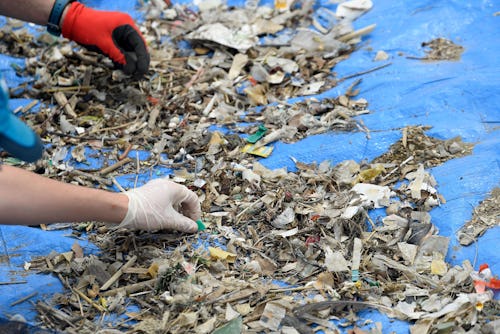Terrifying new research shows we seriously need to cool it with the plastic
Not only are we making more plastic than ever — but we’re also worse at dealing with the waste that comes with it.

There’s little question that plastics — one of the most ubiquitous industrial materials on earth — represent a major hazard for the future of our planet’s fragile ecosystem. The sheer volume of plastic produced makes it one of the lynchpins of the global economy. At the same time, that same astonishing rate of production raises the bar exponentially higher for industrial suppliers, environmental activists, and politicians alike to fully address the enormity of our problematic reliance on plastics in our everyday lives. To prove it, a new study on the state of the world’s plastics consumption has come to the fairly obvious conclusion: We absolutely need to chill with plastics, or else.
The just-released “Global Plastics Outlook” report from the Organization for Economic Cooperation and Development is unambiguous in its diagnosis. Noting that while plastic production has nearly doubled in the past two decades, the study’s authors stress that plastic waste has also more than doubled in the same time frame. What’s more, they write: “After taking into account losses during recycling, only 9% of plastic waste was ultimately recycled, while 19% was incinerated and almost 50% went to sanitary landfills. The remaining 22% was disposed of in uncontrolled dumpsites, burned in open pits or leaked into the environment.”
Put simply: We as a species are making much more plastic than ever before, yet are doing even worse at addressing the massive amount of waste generated by that growth. The problem was exacerbated by the past few years of the COVID pandemic, which saw a slight decrease in plastics use overall due to general economic and social slowdowns, but simultaneously resulted in a significant uptick in single-use plastics (plastic bags, utensils, etc.) that are more prone to being thrown out rather than recycled.
And the environmental effect is profound. After highlighting the fact that the sheer buildup of plastics in the planet’s waterways means we’ll likely be contending with plastic’s negative impact for decades to come — no matter what solutions are applied now — the study’s authors estimated that plastics contributed “3.4% of global greenhouse gas emissions throughout their life cycle.”
“In 2019, plastics generated 1.8 billion tonnes of greenhouse gas emissions,” they continue, with 90% coming from their production and conversion from fossil fuels.
Despite the enormity of the problem, the study’s authors have identified a number of ways to, as they put it, “make the plastics life cycle more circular” by increasing international cooperation, industrial incentivization, and scientific development to close the loops that have allowed such gargantuan amounts of plastic to escape into the environment unchecked.
None of the solutions, such as they are, advocate banning plastics altogether, but their cumulative message is clear: We need to cool it with our plastics consumption, and get a better handle on not only recycling the plastics already out there, but also incorporating the recycling-and-recycled-plastics process as a whole into the larger industrial cycle. To do anything less is to condemn the planet to a rapidly oncoming plasticine catastrophe.